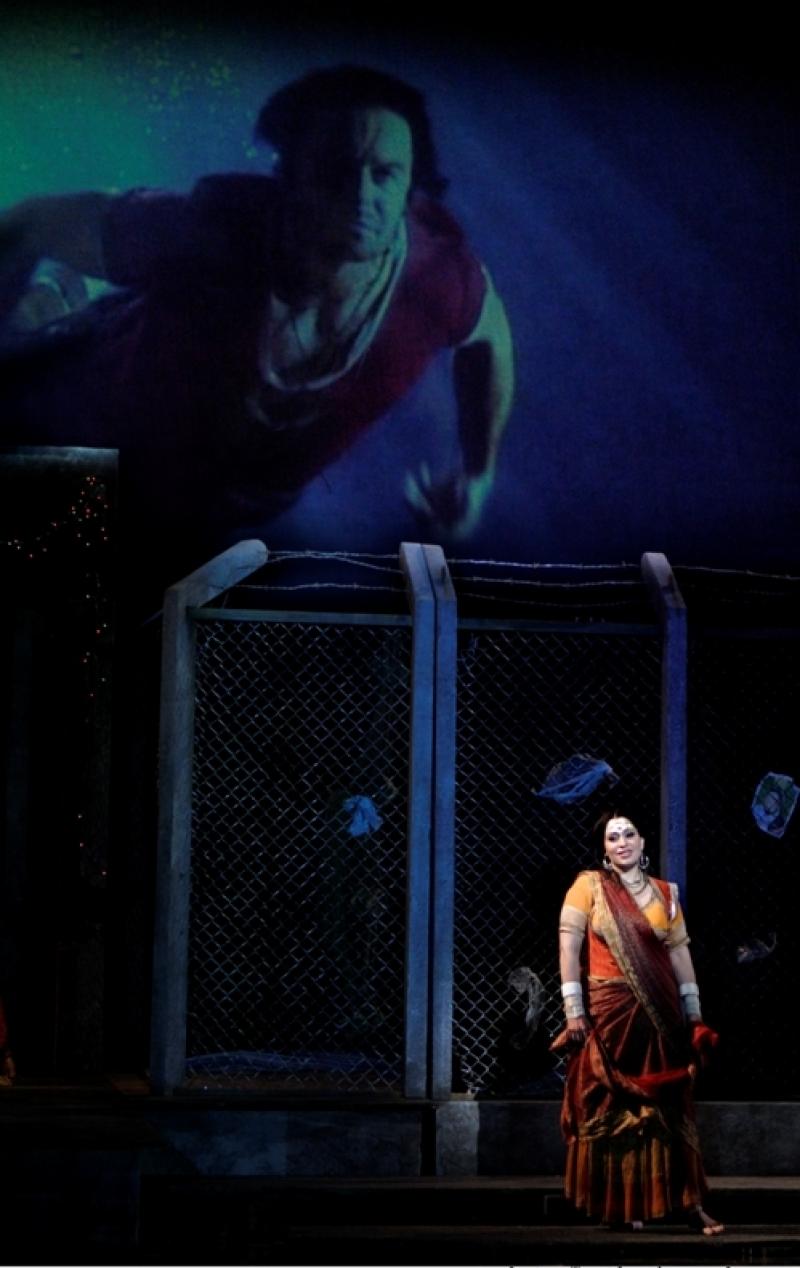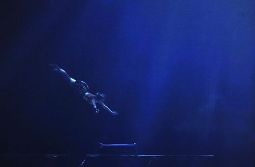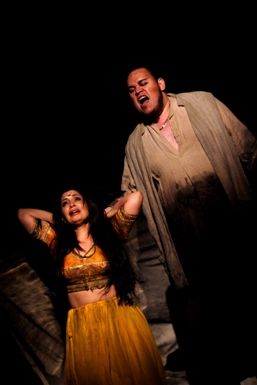The Pearl Fishers, English National Opera | reviews, news & interviews
The Pearl Fishers, English National Opera
The Pearl Fishers, English National Opera
Visually arresting, vocally strong production takes Bizet's oriental hokum seriously

To both paraphrase and contradict one of the many French critics who savaged young Bizet, his first stage work of genius mentions no fishers in its gawky libretto but offers strings of pearls in the music. That's to say, much more than the famous duet, the least moving number on offer last night. I’ve come to love this fitfully ravishing score’s gentle, intimate side but had given up on seeing a less than tawdry staging to solve the opera’s gimcrack orientalia.
Bizet's librettists, Cormon and Carré, didn't really know, or probably much care, where they were: pearl fishers, or rather divers, Nadir and Zurga invoke the Buddhist temple in Kandy, Sri Lanka, in the context of hymns to Hindu god Brahma. The exotic setting, to mix clichés in the French so woefully lacking from Martin Fitzpatrick's archaic-sounding English translation, is more a question of mise en scène than raison d'être. So alarm bells might have rung when Woolcock in the advance blurb linked the force of the sea with climate change. Both she and ENO had to be trusted, though: her production of Adams's Doctor Atomic, shuttling between the New York Met and the London Coliseum, provided the kind of unforgettable images with which the company has been forging a new identity over the past couple of seasons.
 Sure enough, from the opening image of divers plunging to gather pearls from the sea bed (pictured right) against the placid strains of Bizet's introduction, the look of Dick Bird's set designs as complemented by Jennifer Shriever's lighting is well in line with ENO's current visual crest of a wave. Woolcock locates the action in a present-day shanty-town community by the sea, complete with a couple of snap-happy tourists; but given the Hindu sense of beauty and colour in worship and clothing - realistically realised by Kevin Pollard's costumes - it's no earnest, miserabilist affair. Nor are the people happy, smiling natives: mob violence can erupt at the flick of an unholy switch. Incisive choral work and rising-star conductor Rory Macdonald's careful balancing act in the pit made sure that Bizet's least characteristic, grand-opera mode was almost as convincing as the rest.
Sure enough, from the opening image of divers plunging to gather pearls from the sea bed (pictured right) against the placid strains of Bizet's introduction, the look of Dick Bird's set designs as complemented by Jennifer Shriever's lighting is well in line with ENO's current visual crest of a wave. Woolcock locates the action in a present-day shanty-town community by the sea, complete with a couple of snap-happy tourists; but given the Hindu sense of beauty and colour in worship and clothing - realistically realised by Kevin Pollard's costumes - it's no earnest, miserabilist affair. Nor are the people happy, smiling natives: mob violence can erupt at the flick of an unholy switch. Incisive choral work and rising-star conductor Rory Macdonald's careful balancing act in the pit made sure that Bizet's least characteristic, grand-opera mode was almost as convincing as the rest.
What many of us love the work for, though, is its abundance of intimate lyric gestures, voices entwined with many exquisite orchestral solos (horns and flute very much in the limelight). Alfie Boe's light, bright tenor is under too much premature pressure to forge the long, arching lines we need to crown the duet - and the Coli really isn't the house for him - but he charms in his Act One reverie. As, even more so, does Hanan Alattar in her Act Two counterpart. The lyric soprano voice, perhaps, is too open and not as alluring as predecessors Valerie Masterson and Mary Plazas, but she uses it with impeccable musicianship and looks every inch the part for perhaps the first time in the opera's performing history. Here's a great example of production working imaginatively with voice and orchestra: as Leila sings of the lover she can't forget, a giant Alfie Boe swims wraith-like in huge video projections (excellent work, as in the company's earlier marine excursion Riders to the Sea, by Fifty-Nine Productions).
 The vocal palm, though, goes to revelation of the season so far, Hawaiian baritone Quinn Kelsey (pictured with Hanan Alattar's Leila left) as the friend faced with the dilemma of whether to punish his beloved Nadir's sacrilegious pursuit of the priestess they both love. His Verdian sound is full and rich from ringing top to resonant bottom, the expressive use of the hoary text moving to tears. What follows his meltingly beautiful aria in Bizet's Act Three shows Woolcock working superbly with the duet form: Alattar's Leila begins with pious Hindu supplications, again taken from the life, but ends up defiant of the big man's violence. It only reinforces that Bizet's essential drama is the usual conventional operatic love triangle, try as Woolcock may to show us the tragic results of the village-burning with which Zurga allows the lovers to effect their getaway. She helps her three main soloists with plenty of front-of-stage delivery, though there's no denying that the piece would work even better in a smaller theatre like Glyndebourne, which could have spearheaded a French lyric revival. Still, I wouldn't mind seeing what Woolcock could make of Lakmé at ENO. The soaring ideas of Bizet and Delibes are too strong to be sunk by plots that turn out to be far from unworkable.
The vocal palm, though, goes to revelation of the season so far, Hawaiian baritone Quinn Kelsey (pictured with Hanan Alattar's Leila left) as the friend faced with the dilemma of whether to punish his beloved Nadir's sacrilegious pursuit of the priestess they both love. His Verdian sound is full and rich from ringing top to resonant bottom, the expressive use of the hoary text moving to tears. What follows his meltingly beautiful aria in Bizet's Act Three shows Woolcock working superbly with the duet form: Alattar's Leila begins with pious Hindu supplications, again taken from the life, but ends up defiant of the big man's violence. It only reinforces that Bizet's essential drama is the usual conventional operatic love triangle, try as Woolcock may to show us the tragic results of the village-burning with which Zurga allows the lovers to effect their getaway. She helps her three main soloists with plenty of front-of-stage delivery, though there's no denying that the piece would work even better in a smaller theatre like Glyndebourne, which could have spearheaded a French lyric revival. Still, I wouldn't mind seeing what Woolcock could make of Lakmé at ENO. The soaring ideas of Bizet and Delibes are too strong to be sunk by plots that turn out to be far from unworkable.
- The Pearl Fishers runs at ENO until 8 July. Roland Wood takes over from Quinn Kelsey from 29 June
- See what's on at English National Opera this season
The future of Arts Journalism
You can stop theartsdesk.com closing!
We urgently need financing to survive. Our fundraising drive has thus far raised £49,000 but we need to reach £100,000 or we will be forced to close. Please contribute here: https://gofund.me/c3f6033d
And if you can forward this information to anyone who might assist, we’d be grateful.

Subscribe to theartsdesk.com
Thank you for continuing to read our work on theartsdesk.com. For unlimited access to every article in its entirety, including our archive of more than 15,000 pieces, we're asking for £5 per month or £40 per year. We feel it's a very good deal, and hope you do too.
To take a subscription now simply click here.
And if you're looking for that extra gift for a friend or family member, why not treat them to a theartsdesk.com gift subscription?
more Opera
 Buxton International Festival 2025 review - a lavish offering of smaller-scale work
Allison Cook stands out in a fascinating integrated double bill of Bernstein and Poulenc
Buxton International Festival 2025 review - a lavish offering of smaller-scale work
Allison Cook stands out in a fascinating integrated double bill of Bernstein and Poulenc
 Tosca, Clonter Opera review - beauty and integrity in miniature
Happy surprises and a convincing interpretation of Puccini for today
Tosca, Clonter Opera review - beauty and integrity in miniature
Happy surprises and a convincing interpretation of Puccini for today
 Hamlet, Buxton International Festival review - how to re-imagine re-imagined Shakespeare
Music comes first in very 19th century, very Romantic, very French operatic creation
Hamlet, Buxton International Festival review - how to re-imagine re-imagined Shakespeare
Music comes first in very 19th century, very Romantic, very French operatic creation
 Falstaff, Glyndebourne review - knockabout and nostalgia in postwar Windsor
A fat knight to remember, and snappy stagecraft, overcome some tedious waits
Falstaff, Glyndebourne review - knockabout and nostalgia in postwar Windsor
A fat knight to remember, and snappy stagecraft, overcome some tedious waits
 Salome, LSO, Pappano, Barbican review - a partnership in a million
Asmik Grigorian is vocal perfection in league with a great conductor and orchestra
Salome, LSO, Pappano, Barbican review - a partnership in a million
Asmik Grigorian is vocal perfection in league with a great conductor and orchestra
 Semele, Royal Opera review - unholy smoke
Style comes and goes in a justifiably dark treatment of Handelian myth
Semele, Royal Opera review - unholy smoke
Style comes and goes in a justifiably dark treatment of Handelian myth
 Le nozze di Figaro, Glyndebourne review - perceptive humanity in period setting
Mostly glorious cast, sharp ideas, fussy conducting
Le nozze di Figaro, Glyndebourne review - perceptive humanity in period setting
Mostly glorious cast, sharp ideas, fussy conducting
 Fidelio, Garsington Opera review - a battle of sunshine and shadows
Intimacy yields to spectacle as Beethoven's light of freedom triumphs
Fidelio, Garsington Opera review - a battle of sunshine and shadows
Intimacy yields to spectacle as Beethoven's light of freedom triumphs
 Dangerous Matter, RNCM, Manchester review - opera meets science in an 18th century tale
Big doses of history and didaction are injected into 50 minutes of music theatre
Dangerous Matter, RNCM, Manchester review - opera meets science in an 18th century tale
Big doses of history and didaction are injected into 50 minutes of music theatre
 Mazeppa, Grange Park Opera review - a gripping reassessment
Unbalanced drama with a powerful core, uninhibitedly staged
Mazeppa, Grange Park Opera review - a gripping reassessment
Unbalanced drama with a powerful core, uninhibitedly staged
 Saul, Glyndebourne review - playful, visually ravishing descent into darkness
Ten years after it first opened Barrie Kosky's production still packs a hefty punch
Saul, Glyndebourne review - playful, visually ravishing descent into darkness
Ten years after it first opened Barrie Kosky's production still packs a hefty punch
 Così fan tutte, Nevill Holt Festival/Opera North review - re-writing the script
Real feeling turns the tables on stage artifice in Mozart that charms, and moves
Così fan tutte, Nevill Holt Festival/Opera North review - re-writing the script
Real feeling turns the tables on stage artifice in Mozart that charms, and moves

Add comment